The text of the Book of Mormon indicates that the peoples within the narrative took great care to preserve their language from evolving or fracturing into different dialects. They wrote in Reformed Egyptian to supposedly “save space” and spoke and read Hebrew. In 1st Nephi, Nephi is commanded to get the brass plates from Jerusalem to preserve “unto our children the language of our fathers” (1 Nephi 3:19). Later in the text, the Nephite nation encounters a second group of Hebrew migrants and finds that their “language had become corrupted; and they had brought no records with them”. As a result, Mosiah (the Nephite leader) found it necessary that they should be taught in his (Hebrew) language (Omni 1:17–18). For the duration of the Book of Mormon narrative, there is no indication that the principle narrative groups ever deviated from their language of origin (spoken or written) for 1000 years. To the contrary, the current body of evidence indicates that there were many different spoken and written languages utilized among the various peoples of Ancient America that have no resemblance to Hebrew or Egyptian texts or languages.
Due to the physical absence of the gold plates, there is no body of Ancient American evidence with which to compare Joseph Smith’s claim that Ancient Americans wrote Reformed Egyptian. Except — the famous ‘Anthon Transcript’ which was taken to Professor Charles Anthon for a certificate of authenticity may still exist.
Anthon Transcript
See http://mormonthink.com/book-of-mormon-problems.htm#anthon for an in depth analysis of the whole ‘Anthon Transcript’ experience. What I found interesting is that the Community of Christ has what is purported to be part of the document brought to Professor Anthon:

What gives this paper more credibility is that twice in late 1844, portions of these symbols were again published as characters that Joseph Smith, Jr had copied from the gold plates. Characters appeared in the December 21 issue of the Mormon newspaper The Prophet. Also, in 1844 the Latter-day Saints published a broadside (see below) with the title “Stick of Joseph” which contained supposed characters copied from the plates. The characters are basically the same as those from the Anthon transcript.
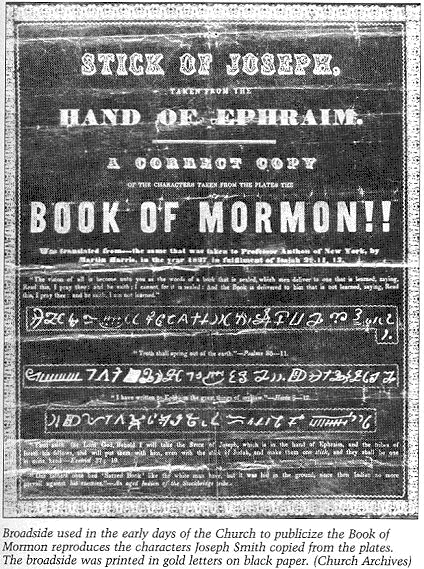
And again in 1980, The LDS church printed an edition of the Book of Mormon that featured the same characters from the Anthon Transcript on the front and back covers of a Book of Mormon made with gold covers to simulate what the gold plates may have looked like. The photo below is of one of these 1980 editions.

Based on these uses, I conclude that the LDS church trusts that these are the characters from the Anthon Transcript or at least characters that Joseph Smith, Jr copied from the plates for some other reason. So, what do the characters say? Nothing. Several scholars, LDS and not LDS, have tried to make any sense of the lines, with no real luck. What I gather as being one of the more accepted conclusions among non-LDS scholars is that the paper was written by someone who had a book containing various alphabets from which to copy or adapt. Here is one analysis comparing many of the marks to a Latin shorthand called Tironian notes. The photo below shows the comparison with the Anthon characters on the left and the shorthand on the right:
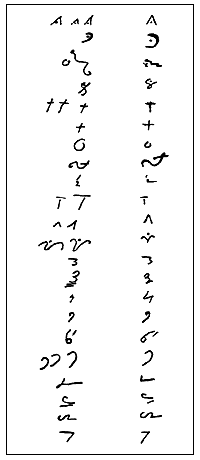
It is difficult to believe that the characters are reformed egyptian after this perspective is presented.
Greek and Other Language Issues
For a very detailed analysis of many of the language issues in the Book of Mormon, please see https://packham.n4m.org/linguist.htm. I’ll summarize a few of what I think are the biggest problems here, but go there for more detail if any of this is interesting.
Joseph Smith, Jr. stated that “There was no Greek or Latin upon the plates from which I, through the grace of the Lord, translated the Book of Mormon.” (Times and Seasons, Vol.4, No.13, May 15, 1843, p.194). However there are several places that have no meaning without Greek or Latin being found on the plates.
“Christ the Messiah”
The Hebrew word which gives us the term “messiah” is ‘mashiach,’ meaning literally “[the] anointed [one].” It is used in the Hebrew Old Testament 47 times in reference to all anointed persons such as priests and kings. It is only relatively late in Hebrew literature that it came to have the additional special meaning of the yet-to-come anointed king of the house of David who was expected to appear and free the Jews from foreign domination and establish God’s kingdom forever on earth.
Usually in the New Testament, which was written in Greek, the Hebrew word ‘mashiach’ is translated into Greek with the Greek word which means “anointed”: ‘christos’, and that Greek word is usually not translated into English, but only transliterated (anglicized), as “Christ,” with a capital letter.
In the Greek of the New Testament, of course, he was referred to as “Jesus the Anointed One” (‘Iesous ho christos’), which in Hebrew or Aramaic would be something like “Ieshua ha mashiach.”
Now, when we look at the Book of Mormon (supposedly translated from Hebrew written in Reformed Egyptian), we find that the term “Messiah” occurs about 25 times. The term “Christ” occurs about 317 times.
Joseph Smith, Jr insisted that there was no Greek on the plates. So how could sometimes “the Anointed One” be translated as “Messiah” while other times it is translated as “Christ”?
Especially troubling are verses like:
2 Nephi 25:19
For according to the words of the prophets, the Messiah cometh in six hundred years from the time that my father left Jerusalem; and according to the words of the prophets, and also the word of the angel of God, his name shall be Jesus Christ, the Son of God.
So first, I’m comfortable stating that no scholar believes that Jesus’s name was “Jesus Christ”, being the son of “Joseph Christ” and “Mary Christ”. Additionally, this would mean that the angel of God spoke to the hebrews in Greek at times, instead of their own language. That doesn’t work.
“Synagogue”
Alma 16:13
And Alma and Amulek went forth preaching repentance to the people in their temples, and in their sanctuaries, and also in their synagogues, which were built after the manner of the Jews.
Scholars of Jewish religious history are almost unanimous in the view that the synagogue, which we think of as so typical of Jewish religious life, did not exist before the destruction of the temple and the Babylonian Captivity, which was definitively after Lehi and the family left. So how could any Nephite know about “synagogues … after the manner of the Jews”? It may or may not be surprising at this point that the word “synagogue” is also Greek (from ‘syn-’ “together” and ‘ag-’ “bring, lead”).
“Bible” and more Greek words
Our English word “Bible” is an anglicization of the Greek word ‘biblia’, which means “books,” and is simply the plural of the Greek word ‘biblion’ meaning “book.” The chapter of 2 Nephi 29 is odd for many reasons in itself, but the Greek words written by a Hebrew speaking, Reformed Egyptian writing people adds additional difficulty.
The following names from the Book of Mormon are also Greek in origin:
Antipas, Antipus, Archeantus, Ezias, Jonas, Judea, Alpha and Omega, Timothy, Zenos, Angola
The Book of Mormon mentions a harlot named Isabel (Alma 39:3). “Isabel” is a name that only came into use in France and Italy during the late Middle Ages. Except, the Nephites invented it first, by over 1,000 years.

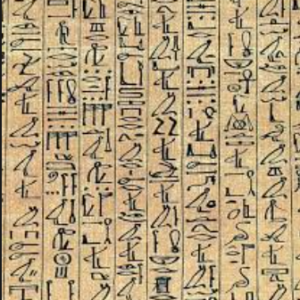
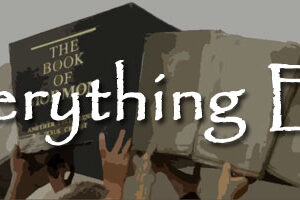
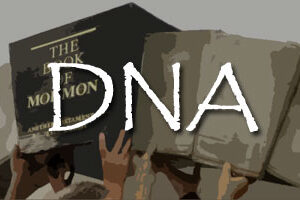
Leave a Reply